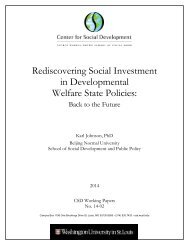Exploring and Assessing Intercultural Competence - Center for ...
Exploring and Assessing Intercultural Competence - Center for ...
Exploring and Assessing Intercultural Competence - Center for ...
Create successful ePaper yourself
Turn your PDF publications into a flip-book with our unique Google optimized e-Paper software.
<strong>Exploring</strong> <strong>and</strong> <strong>Assessing</strong> <strong>Intercultural</strong> <strong>Competence</strong><br />
Once completed <strong>for</strong>ms were returned, RAs tabulated the data gathered from questionnaires <strong>and</strong><br />
interviews in their respective languages, following guidelines provided by the project director,<br />
<strong>and</strong> converted results into English. As <strong>for</strong>ms were received in Vermont, they were coded,<br />
compiled, <strong>and</strong> inputted into a single combined set (i.e., the Banner Set). Our statistician then<br />
transferred quantitative data into SPSS (the Statistical Package <strong>for</strong> Social Sciences) <strong>for</strong> analysis,<br />
<strong>and</strong> qualitative data were separately analyzed directly from the <strong>for</strong>ms themselves. Details<br />
regarding these analyses are narrated below.<br />
A. Advantages<br />
7. Advantages <strong>and</strong> Limitations of This Project<br />
As already stated, this initial Project was envisioned as part of a larger follow-on research ef<strong>for</strong>t.<br />
Although it involved participants from only three countries, it provided a wonderful opportunity<br />
to finalize the test instrument <strong>and</strong> pilot the initial survey. This has helped to advance FEIL’s<br />
research interests by allowing us to conceptualize, implement, <strong>and</strong> pilot both the instrument <strong>and</strong><br />
the initial survey. In a follow-on worldwide survey, FEIL will engage all MOs with the capacity<br />
to identify <strong>and</strong> contact their own alumni.<br />
Two-way assessments (of self <strong>and</strong> others) like the one used with current volunteers in Ecuador<br />
plus their mentors, are also important <strong>and</strong> unusual. They obtain dual perspectives <strong>and</strong> permit<br />
comparing the views of sojourner <strong>and</strong> hosts. Even though both parties seldom concur, their<br />
differing views are nonetheless instructive. The emic (or host) view of the hosts is seldom<br />
addressed in most studies, yet it is an important research dimension <strong>and</strong> one that we will attempt<br />
to get at in more depth in the follow-on study, building on our current experience.<br />
Finally, it is instructive to view data from multiple groupings (in this case, the Ecuadorians,<br />
British, <strong>and</strong> Swiss) <strong>and</strong> to compare <strong>and</strong> contrast results by nationality. Points of convergence <strong>and</strong><br />
divergence suggest aspects that are “particularist” (pertaining to a single group), while combined<br />
data suggest potentially “universalist” aspects (applying widely to many or all groups).<br />
B. Limitations<br />
The Project’s limitations were primarily the constraints of time, resources, <strong>and</strong> staffing. For this<br />
reason, a control group allowing the comparison of results with other populations was not<br />
posited. This may be rectified in a continuation study. Possibilities exist <strong>for</strong> finding individuals<br />
not directly involved in intercultural experiences through the local MOs. We would also like to<br />
learn more about any potential “indirect” benefits accruing to hosts coming into contact with<br />
sojourners.<br />
The Initial Phase Project also faced many variables that cannot be completely controlled. In fact,<br />
the project’s design was both its <strong>for</strong>te <strong>and</strong> its challenge; it allowed us to investigate senders <strong>and</strong><br />
receivers outside of the United States, but also meant working through research assistants at a<br />
distance. Obviously, we could not directly supervise administration of the survey <strong>for</strong>m nor the<br />
compilation <strong>and</strong> analysis of initial data in each language involved. We attempted to minimize<br />
discrepancies, however, through guidelines <strong>and</strong> close communication with our in-country<br />
assistants.<br />
<strong>Center</strong> <strong>for</strong> Social Development<br />
Washington University in St. Louis<br />
15
















